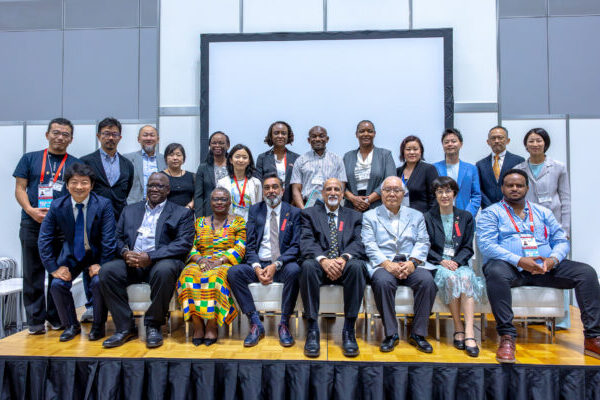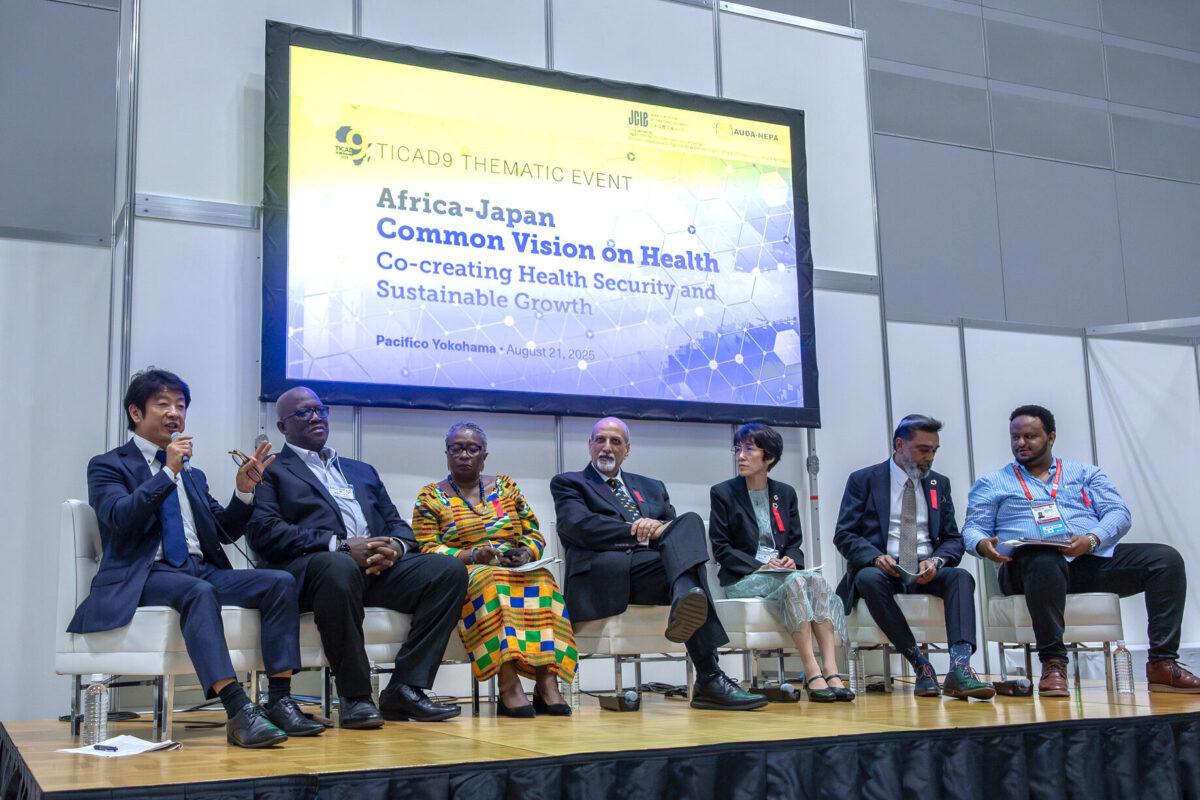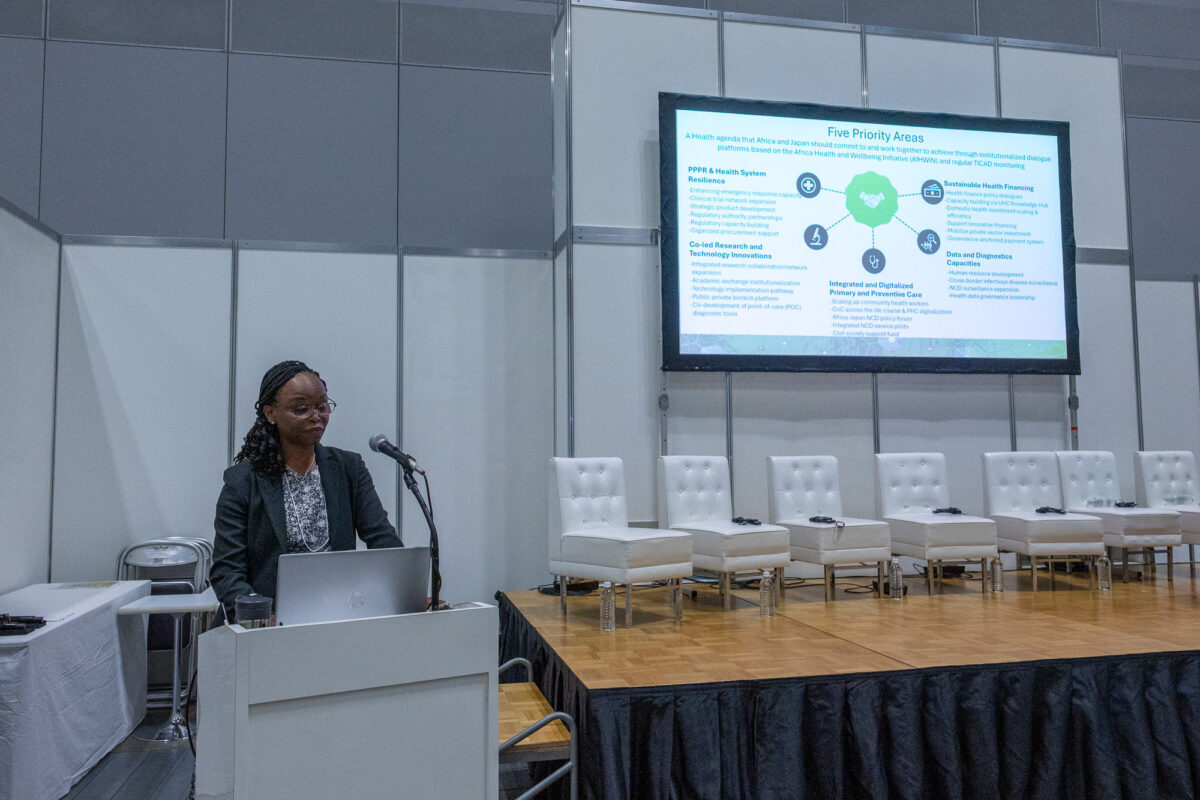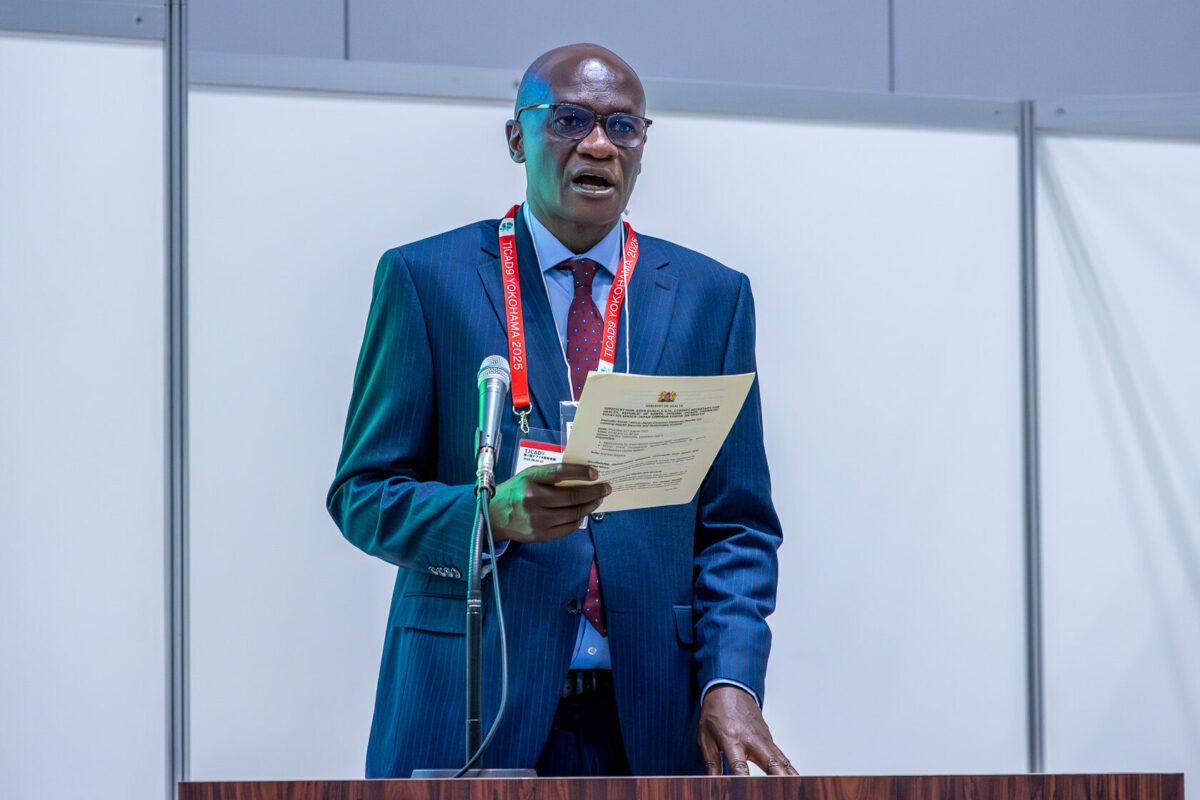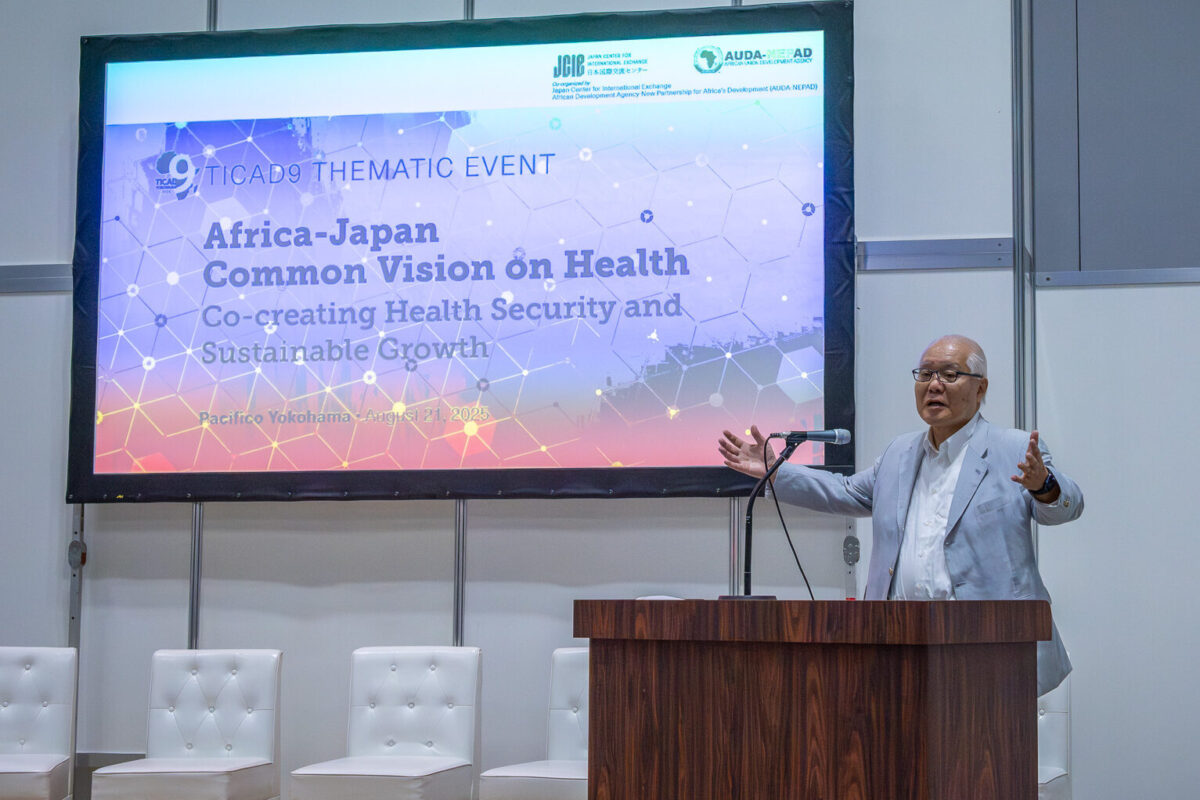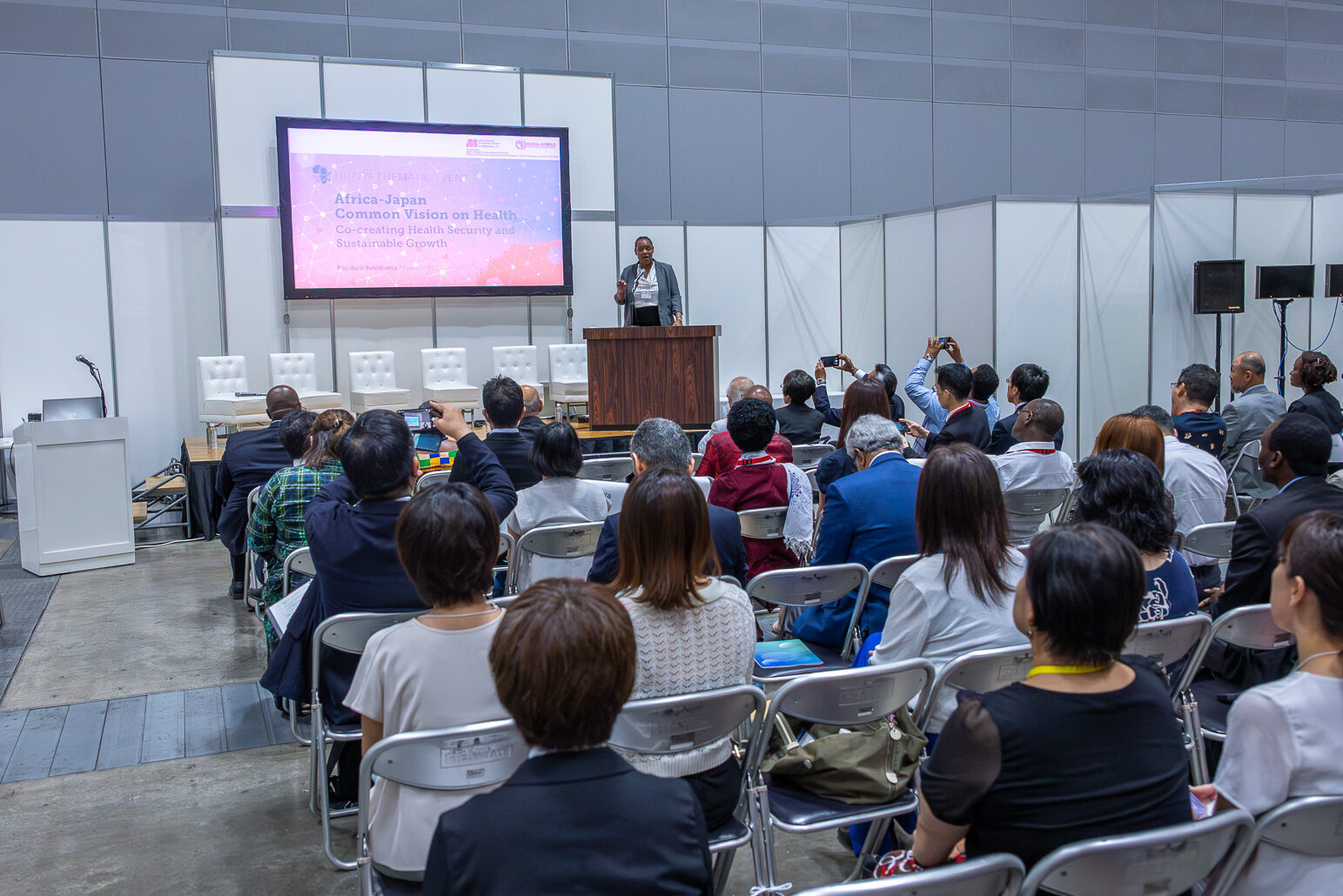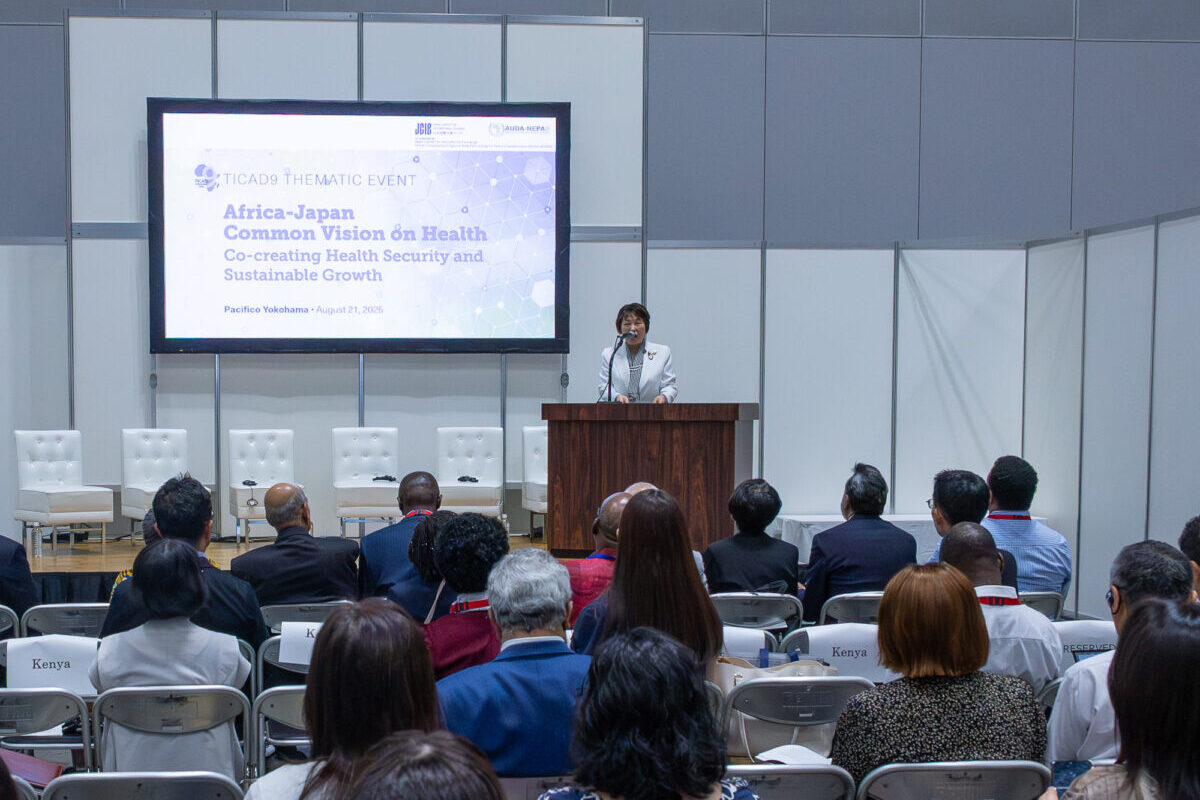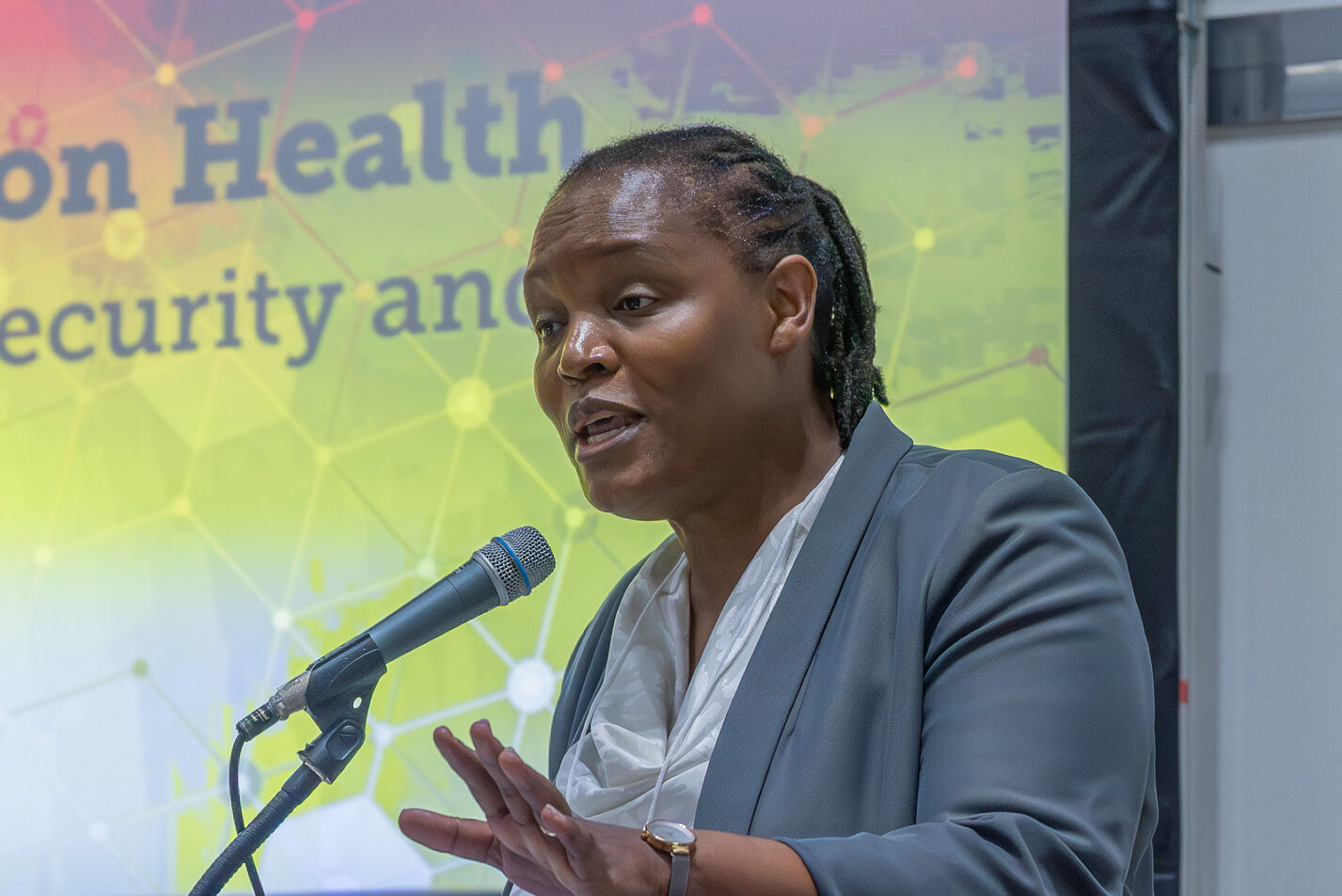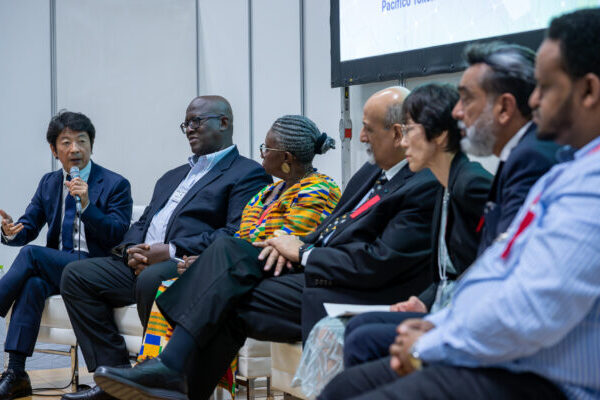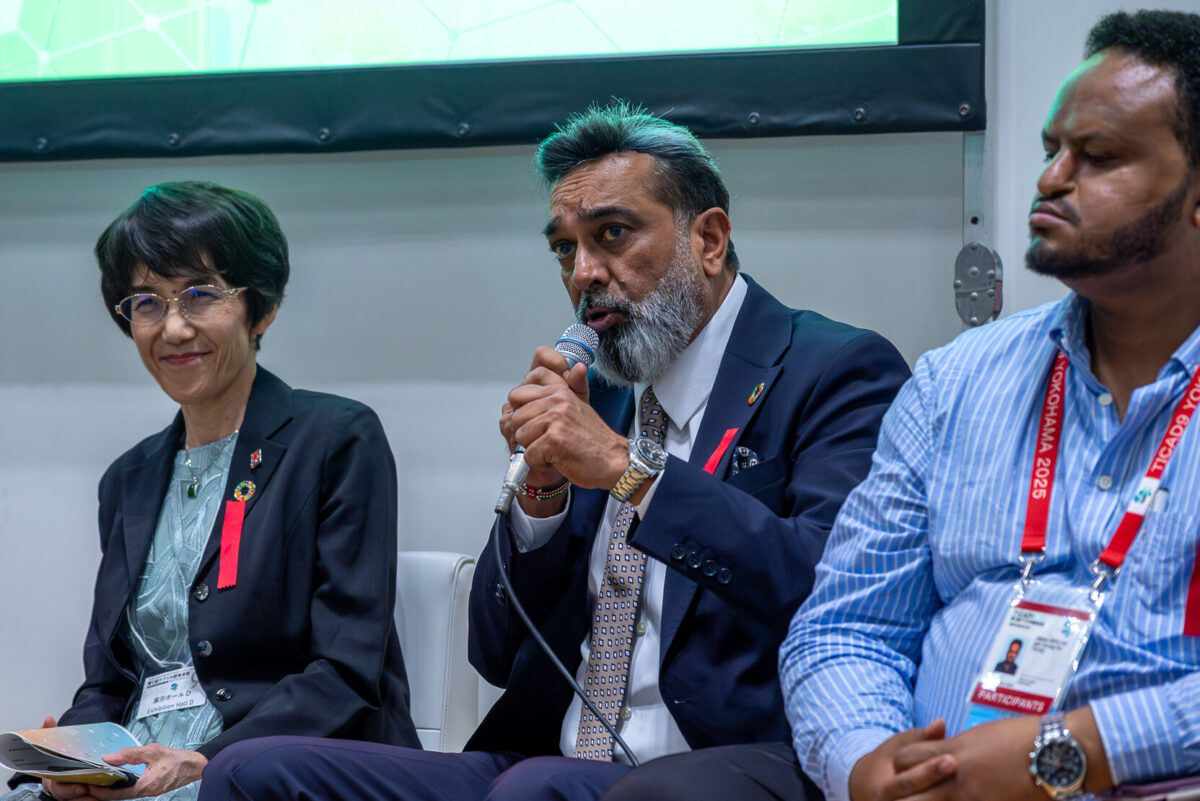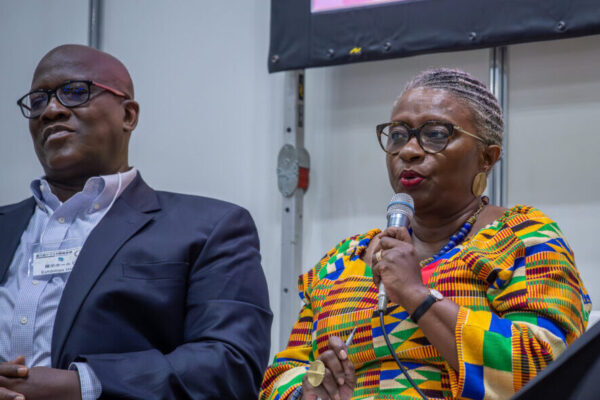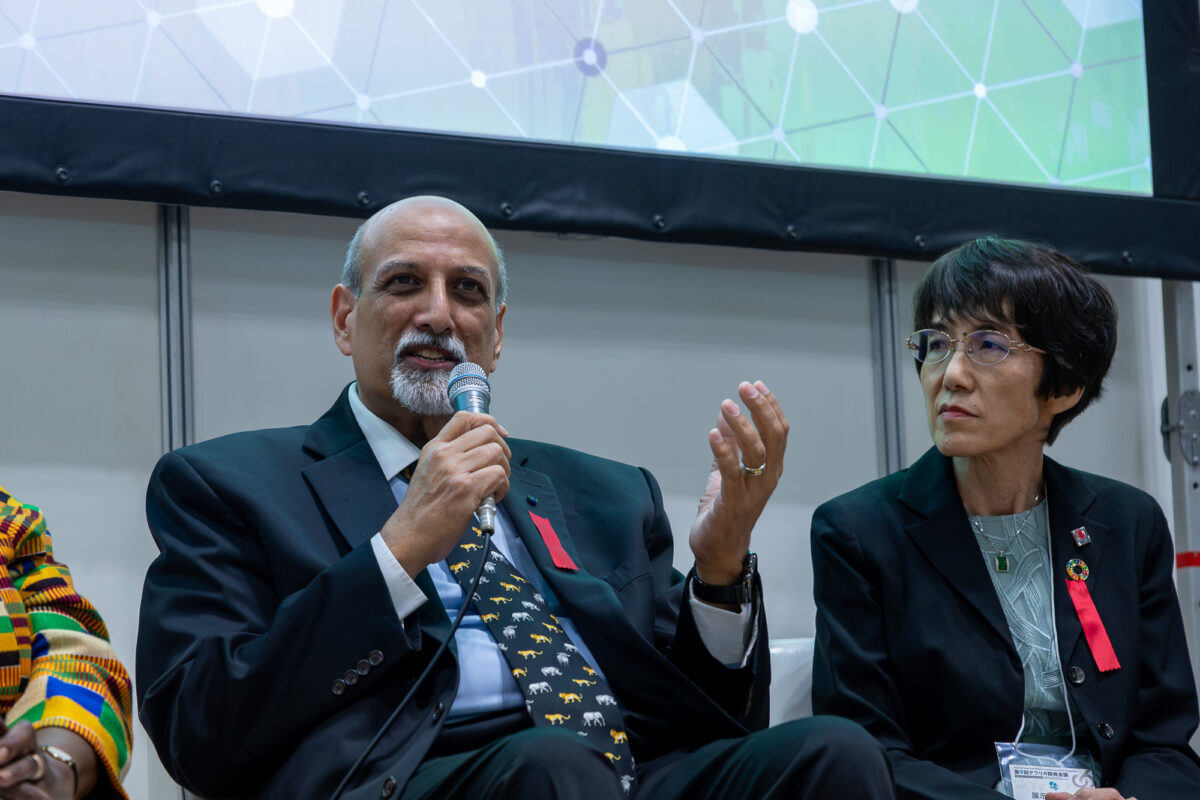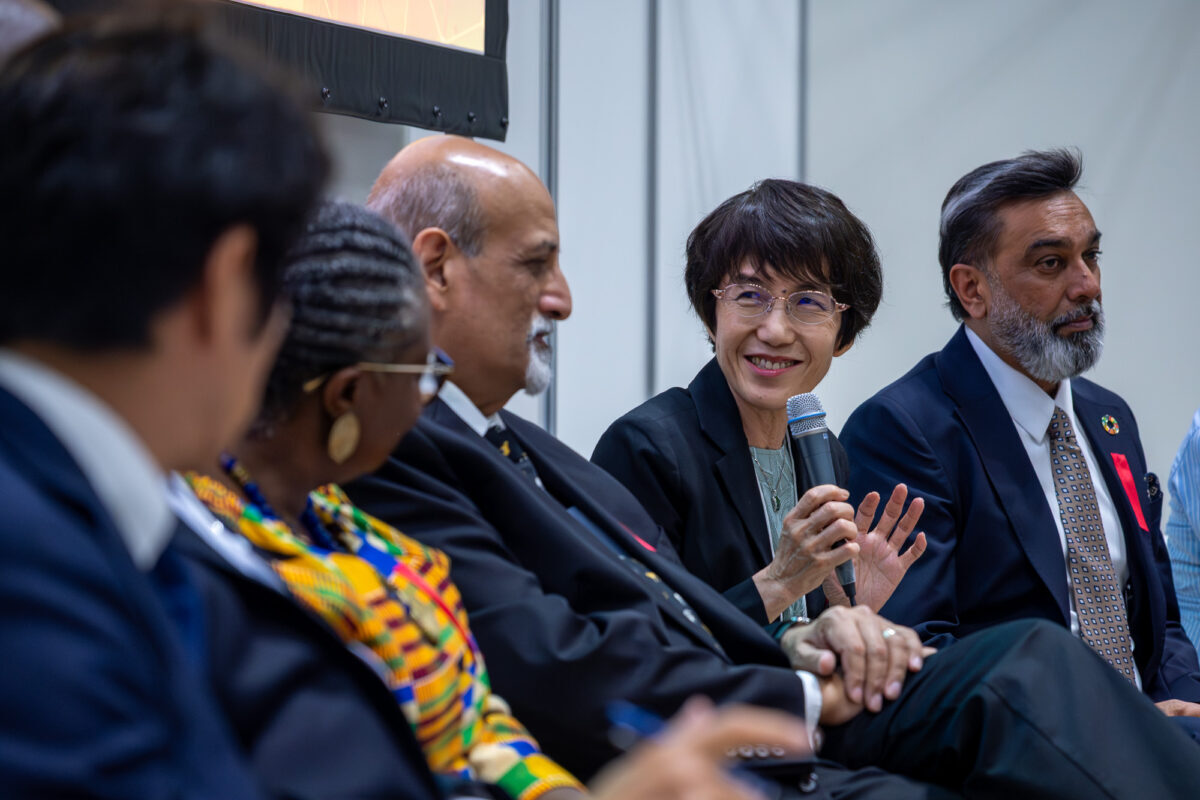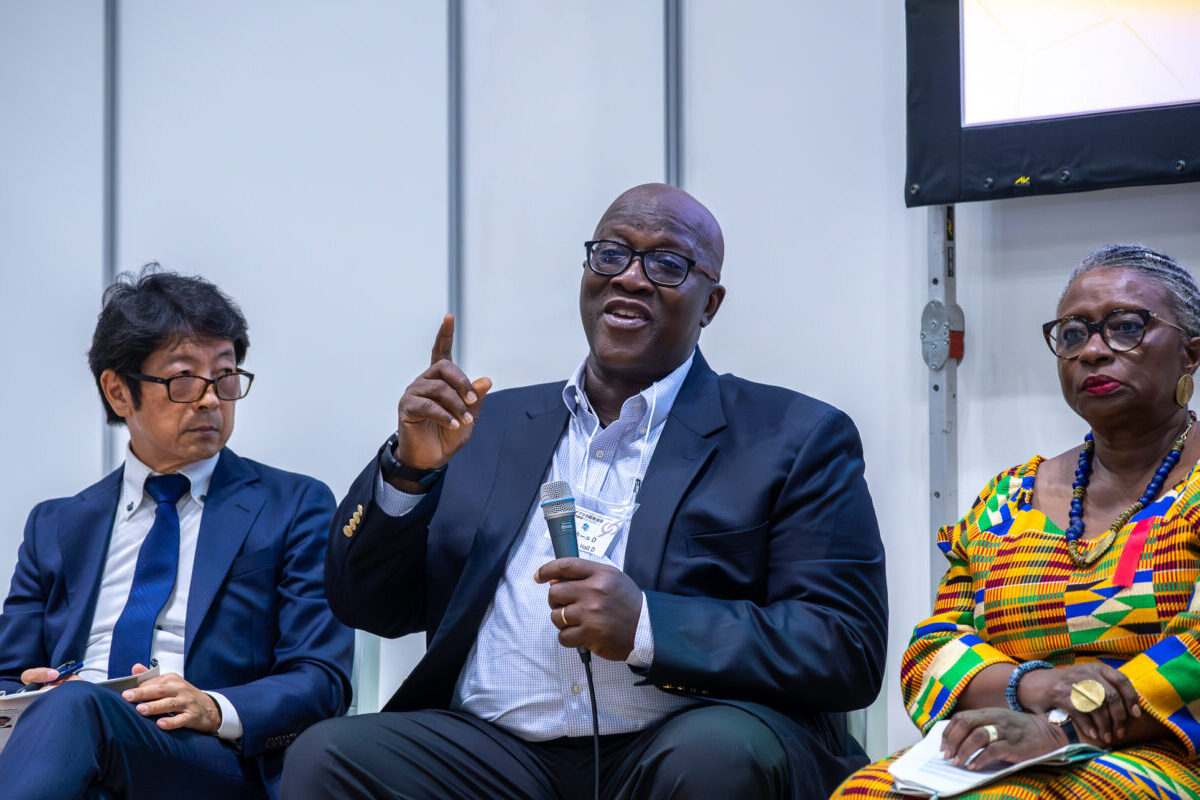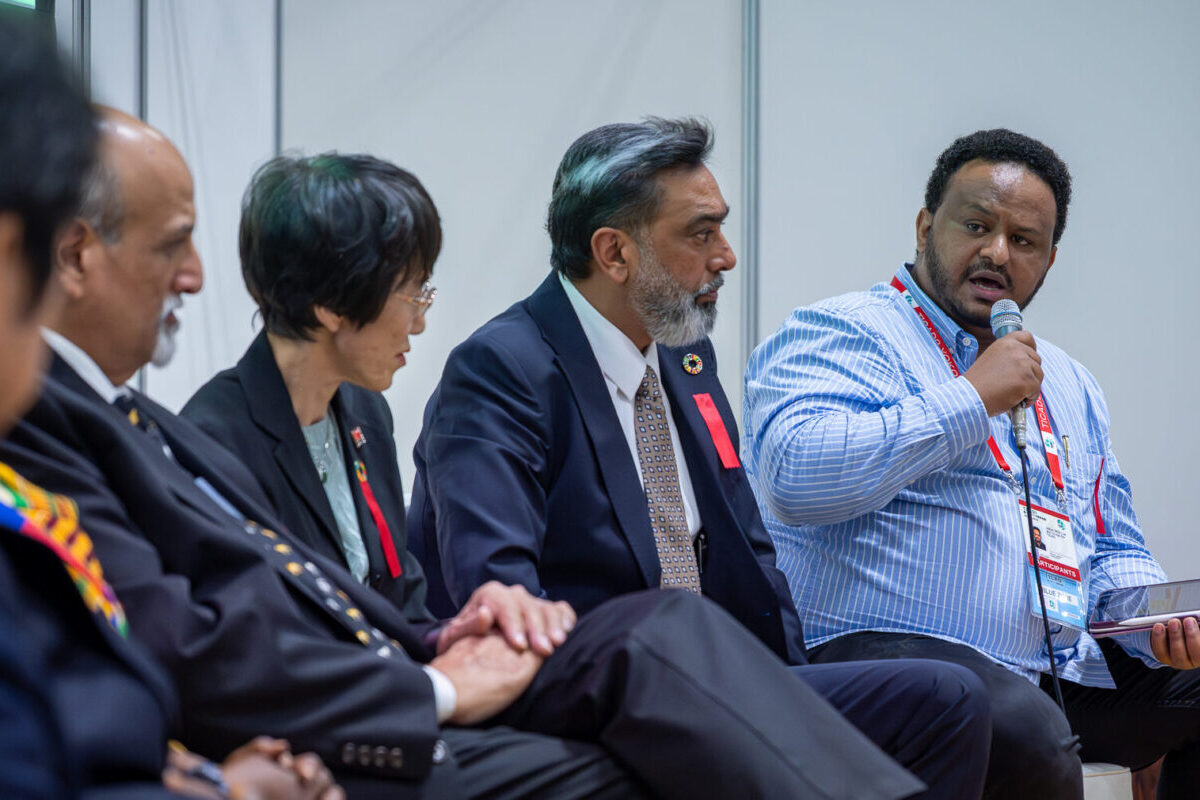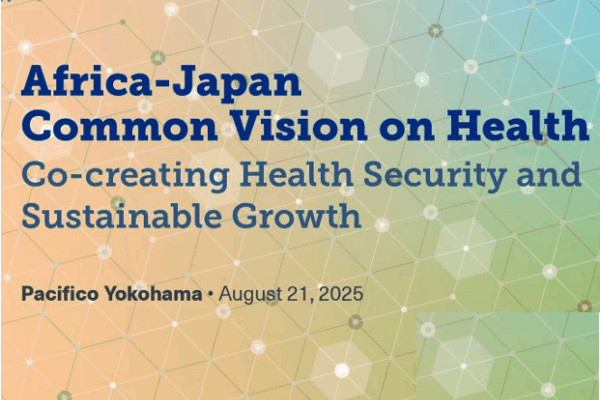In preparation for the 9th Tokyo International Conference on African Development (TICAD9), JCIE launched an independent initiative to define the future direction of Africa-Japan partnership in the health sector toward and beyond 2030—the target year of Sustainable Development Goals (SDGs)—and to propose a “Common Vision” for co-creating health security and sustainable growth that can be shared among public and private stakeholders in Africa and Japan.
On August 21, we convened globally renowned leaders in health, science, policy, and business from Africa and Japan to introduce and deepen discussions on the Common Vision. The panel discussion, held in Yokohama on the sidelines of TICAD9, was moderated by Osamu Kunii, CEO and Executive Director of GHIT Fund, who was the chair of the working group that compiled the Vision. The participants included experts from Africa and Japan with diverse expertise who served as advisors and partners of the group.
The event was organized by the Japan Center for International Exchange (JCIE) in cooperation with the African Union Development Agency-New Partnership for African Development (AUDA-NEPAD).
A summary of the discussions is provided below, as well as the video of the full event.
To read the Common Vision or learn more about the project and the event, please click the links at the top of the page.
Accordion Content
WELCOME
Ms. Satoko Itoh, Managing Director, Japan Center for International Exchange (JCIE)
OPENING REMARKS
Patrick Amoth, Director General for Health, Republic of Kenya
Toshiko Abe, Member, House of Representatives, Japan
KEY MESSAGES OF THE COMMON VISION
Dr. Olukunmi Omobolanle Balogun, Co-lead Author, Working Group on Africa-Japan Common Vision (WG); Junior Associate Professor, St. Luke’s International University Graduate School of Public Health
PANEL DISCUSSION
Moderator: Dr. Osamu Kunii, Chair, the WG; CEO & Executive Director, Global Health Innovation Fund (GHIT Fund)
Panelists:
Dr. Salim S. Abdool Karim, Director, Center for the AIDS Programme of Research in South Africa (CAPRISA), Doris Duke Medical Research Institute, Nelson R Mandela School of Medicine, University of KwaZulu-Natal, South Africa
Prof. William Kwabena Ampofo, Executive Director, African Vaccine Manufacturing Initiative
Mr. Fitsum Lakew Alemayehu, Liaison Manager to the African Union Commission (AUC), WACI Health; Coordinator, the African Civil Society Platform for Health (CiSPHA)
Dr. Magda Robalo, Co-chair, UHC2030 Steering Committee; President and Co-founder, Institute for Global Health and Development, Guinea-Bissau
Ms. Takuko Sawada, Director and Vice Chairperson of the Board, Shionogi & Co., Ltd.
Dr. Amit Thakker, Executive Chairman, Africa Health Business
CLOSING REMARKS
Prof. Keizo Takemi, Senior Fellow, JCIE; former Minister of Health, Labour and Welfare, Japan
Ms. Chimwemwe Chamdimba, Head, African Medicines Regulatory Harmonization Initiative, African Union Development Agency (AUDA-NEPAD)
JCIE Managing Director Ms. Satoko Ito delivered the opening remarks on behalf of the co-organizers, and she explained that the Common Vision was formulated through five months of discussions between experts from Africa and Japan. The framework positions health as the foundation of prosperity and security in both regions and clarifies priority areas for cooperation. She pointed out that the event is just the beginning and that it is important to put the recommendations into practice.
Subsequently, Dr. Patrick Amoth, Director General of Health for Kenya, gave special remarks on behalf of the Kenyan health minister, expressing support for the Vision as a strategic foundation for long-term resilience and inclusive growth. Kenya is also focusing on promoting digital health, strengthening the regulatory framework, and strengthening vaccine clinical trial capabilities through collaboration with private companies, and he called for joint research with Japan and collaboration in the pharmaceutical and medical device fields. He also proposed the establishment of a dialogue between Africa and Japan to discuss strategic health innovation, and called for the construction of a sustainable health system through solidarity and co-creation against the threat of climate change and pandemics that transcend national borders.
Next, the co-lead author of the working group, Dr. Olukunmi Omobolanle Balogun, Junior Associate Professor at the Graduate School of Public Health, St. Luke’s International University, explained the five basic principles and five priority areas for achieving the Vision, explaining the benefits for both Africa and Japan.
Rep. Toshiko Abe, a member of the House of Representatives and Minister of Education, Culture, Sports, Science and Technology, also expressed her support for these efforts to promote co-creation between Africa and Japan.
In the panel discussion that followed, moderator Dr. Osamu Kunii, CEO & Executive Director of the GHIT Fund, called on the panelists to make proposals that would lead to concrete actions, and asked them to share what they considered to be the most important points of the Vision and what challenges could be expected when actually taking action.
Dr. Magda Robalo, Co-chair of the UHC2030 Steering Committee, noted that sustainable health finance is also the foundation for other policy frameworks, such as the Accra Initiative, and mentioned the importance of reviewing the tax system and using resources efficiently. In addition to “South-South cooperation” in Africa, she emphasized the need for the Global North and Global South to build a cooperative system based on mutual respect and the philosophy of “co-creation.”
Dr. Salim Abdool Karim, Director of CAPRISA, emphasized the need for “mutual respect and equitable partnership” in cooperation between Africa and other countries. He also mentioned the importance of co-creation in the field of digital health. In addition to the need for a reliable data infrastructure, he shared concerns about the inability to fully utilize digital systems in Africa due to the cost of implementation and low Internet penetration, and emphasized that cooperation between Japan and Africa in the field of digital health will lead to significant opportunities to meet such needs.
Ms. Takuko Sawada, Director and Vice Chairperson of Shionogi, stressed the need for the education of African healthcare professionals and clear guidelines for diagnosis from the standpoint of developing therapeutic drugs in the field of infectious diseases. She pointed out that the risk of antimicrobial resistance (AMR) is increased by the prescription of drugs without proper diagnosis in African hospitals, and that it is important to strengthen cooperation between the government, medical institutions, and international organizations to improve diagnostic capabilities through cooperation with Japan, in addition to the phased introduction and monitoring of products.
Dr. Amit Thakker, Executive Chairman of Africa Health Business, said that Africa relies on imports of vaccines and that investment in vaccine clinical trial infrastructure should be strengthened in collaboration with Japan. On the other hand, he emphasized that the biggest challenge is sustainable health finance. He emphasized that investment in healthcare can produce results years or even decades later, and that distorted resource allocation caused by inappropriate use of tax revenues due to short-term political considerations and low political priority given to healthcare should be corrected, and funds should be used in a way that will achieve better health outcomes.
Prof. William Ampofo, Executive Director of the African Vaccine Manufacturing Initiative, shared that although he has been advocating for vaccine production in Africa since 2012, after COVID-19 delayed the supply of vaccines to Africa, African CDC and AUDA-NEPAD have finally come to regard the establishment of a vaccine manufacturing system as a top priority. He pointed out that to achieve a sustainable pharmaceutical market, it is important to invest in appropriate tax systems, policies that affect market shaping, and R&D partnerships that are transferring technology from a long-term perspective. In addition, he emphasized the importance of human resource development and proposed efforts to put human resource development at the core through cooperation with Japan.
Mr. Fitsum Lakew Alemayehu, Liaison Manager to the African Union Commission (AUC), WACI Health, emphasized the need for regular progress reviews and course corrections, as well as the need for advocacy by African civil society in order to achieve sustainable health finances. He also argued that civil society in Japan and Africa should be able to leverage their strengths and serve as a bridge to engage governments, international organizations, and the more cost-sensitive private sector.
In his closing remarks, JCIE Senior Fellow Keizo Takemi (former Minister of Health, Labour and Welfare) reaffirmed the importance of building a co-creative relationship between Africa and Japan by leveraging their respective strengths. In particular, he noted that digital technology, human resource development, participation in the private sector, and health finance reform will be important areas in the future cooperation system. He also said that the experience of regulatory harmonization and clinical trial networks in Asia can be deployed in Africa, and called for long-term cooperation, including expanded educational and human resource exchanges.
AUDA-NEPAD’s Head of the African Medicines Regulatory Harmonization Initiative, Ms. Chimwemwe Chamdimba, also emphasized the need to not let the Africa-Japan Common Vision on Health end up as a mere document, but to leverage existing foundations while connecting it to implementation and results through innovative approaches. In response to the proposal to introduce a “scorecard” to visualize progress, she concluded the meeting by saying that the next time we meet, we should not discuss the vision and challenges again, but rather discuss the progress we have made and the impact we have had during that time.

